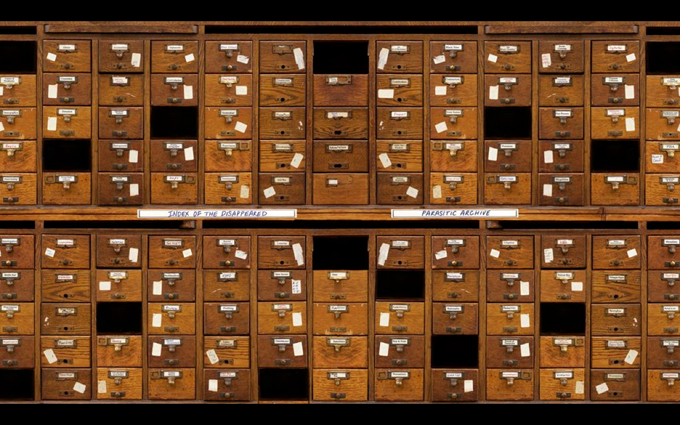
“Radical Archives” was a two-day conference (April 11–12, 2014) organized around the notion of archiving as a radical practice and including both representatives from and considerations of archives of radical politics and practices; archives that are radical or experimental in form or function; and moments or contexts in which archiving in itself becomes a radical act. “Radical Archives” also asked participants to consider how archives can be active in the present as well as documenting the past and generating scripts for the future. The conference featured four threads of radical archival practice: Archive and Affect, or the embodied archive; Archiving Around Absence, or reading for the shadows; Archives and Ethics, or stealing from and for archives; and Archive as Constellation, or archive as method, medium and interface.
“Radical Archives” was presented by New York University’s Asian/Pacific/American Institute at the Cantor Film Center and cosponsored by NYU’s Department of History, Moving Image Archive Program and Archives and Public History Program, along with the Hemispheric Institute of Performance and Politics, the Asia Art Archive and media partner Creative Time Reports. The conference program was formed largely from responses to an open call for proposals, which in turn was developed based on input from a working group of archivists, artists and writers engaged with archives, convened by the Index in fall 2013.
Below is a selection of audio recordings comprising the keynote speeches and several panels: “Inside the Black Boxes: Archives and Erasures,” “The Prison and the Archive,” “Archiving Palestine,” “Diasporic/Decolonized Archives” and “Archives from Below.” To see the full conference program, presenter images and audience notes, check the conference website and Storify.
The Egyptian-Lebanese artist Lara Baladi’s multidisciplinary practice encompasses photography, video, photo collages and digital montages, installations, architectural constructions, tapestries, sculptures and perfume. During the 2011 Egyptian uprising, Baladi cofounded two media initiatives: Radio Tahrir and Tahrir Cinema. Tahrir Cinema served as a public platform to build and share a video archive on and for the revolution. Baladi has also been a member of the Arab Image Foundation since its creation in 1997.
“Inside the Black Boxes: Archives and Erasures” features Douglas Cox and Ramzi Kassem on the National Security Council as a Freedom of Information Act (FOIA) black box; Joshua Craze on the aesthetics of redaction; Melinda Hunt on the forgotten graves of Hart Island; Alexander Manevitz on the cemetery displaced by Central Park; Voichita Nachescu on the troubled history of the archive of the National Alliance of Black Feminists; and Hana Sleiman on the curious fate of the Palestine Liberation Organization (PLO) Research Center archive. Moderated by Allen Feldman.
“The Prison and the Archive” features Francisco Diaz Casique on the Pelican Bay State Prison hunger strikes and the prisoner’s body as archive, Carol Jacobsen on collecting the stories of women prisoners in Michigan and Jaime Taylor on the ethics of archiving in prison contexts. Moderated by Alexis Agathocleous, prisoners’ rights advocate at the Center for Constitutional Rights.
Ann Cvetkovich is Ellen Clayton Garwood Centennial Professor of English and Professor of Women’s and Gender Studies at the University of Texas at Austin. She is the author of Mixed Feelings: Feminism, Mass Culture, and Victorian Sensationalism (Rutgers, 1992); An Archive of Feelings: Trauma, Sexuality, and Lesbian Public Cultures (Duke, 2003); and Depression: A Public Feeling (Duke, 2012). Her current writing projects focus on the state of LGBTQ archives and the creative use of them by artists to create counterarchives and interventions in public history.
In “Archiving Palestine,” members of a recent delegation of librarians and archivists to Palestine explore key themes in understanding the histories, challenges and current work of both community and institutional archive projects. Panelists Grace Lile, Mezna Qato and Maggie Schreiner discuss the destruction of archival collections as well as their rediscovery and recovery and current documentation projects, critically exploring the role of archives in political practice and the challenges of solidarity movements. Moderated by Rachel Mattson.
“Diasporic/Decolonized Archives” features Isabel Alfonso and Susan Lord on Cuban “sneakernets” and the informal archives of Havana cosmopolitanism, Vivek Bald on documenting the undocumented in South Asian American history, John Bradley and Shannon Faulkhead on living archives in indigenous Australia, Rosie Kar on tracing the submerged legacy of the Ghadar Party and Grace Sanders on the Haitian oral history archive Vua Fanm. Moderated by Dean Saranillio.
Members of Brooklyn’s Interference Archive Molly Fair, Bonnie Gordon, Jen Hoyer, Anika Paris, Blithe Riley and Ryan Lee Wong examine how grassroots archives aim to disrupt notions of power by opening up control over the telling of “official” historical narratives; force us to rethink the archival profession’s assumptions about best practices for making information accessible; provide access to materials for people who had a hand in creating them; challenge concepts of ownership over historical cultural materials with a concept of custodianship; form organizational and information systems based on collective cultural knowledge; create space to build community and supportive networks; and offer prefigurative and creative ways of interacting and presenting history and contemporary movements while instigating the creation of new cultural production for current social movements.
Shaina Anand is a filmmaker, artist and cofounder of CAMP, a collaborative studio based in Bombay that combines film, video, installation, software, open-access archives and public programming with broad interests in technology, film and theory. Her keynote speech explores intellectual property and intellectual propriety, testimony and ownership, and archival ethics, examining the Public Access Digital Media Archive (pad.ma), which she initiated together with other members of CAMP, the Berlin-based 0x2620 and Bangalore’s Alternative Law Forum.

